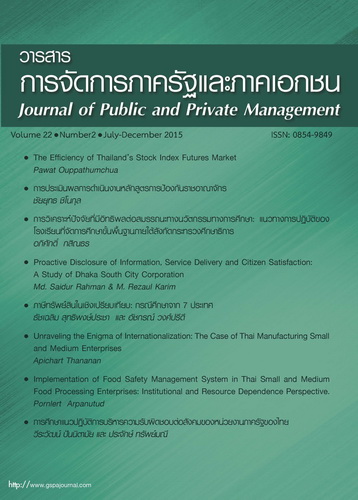The Efficiency of Thailand’s Stock Index Futures Market
Keywords:
Thailand future exchange (TFEX), cointegration, error correction modelAbstract
The objectives of this study were 1) to examine the market efficiency in Thailand Futures Exchange (TFEX) specified in SET50 Index Futures in contracts of different maturity terms 2) to explain the Speed of Adjustment of future spot price in SET50 Index Futures in contracts of different maturity terms 3) to find out the volatility of the futures prices (change in a lag term and Time Varying Risk Premium) and 4) to purpose the TFEX policy implication related to market efficiency in individual contract terms.
This study conclvded that there was no market efficiency in all the contracts. However, the futures price and the future spot price have a long-run relationship in all the contracts when the Cointegration Model was utilized. Futures price in short-term contracts can better represent future spot price than that in long-term contracts. When the Error Correction Model (ECM) was utilized, it was fond that the speed of adjustment of the future spot price in the long-term contract had higher volatility.
TFEX should carefully revise the procedures on how to properly regulate maturity for all financial products in the SET 50 Index Futures because contracts with a maturity term of more than 3 months will have a low level of liquidity and are less predictable for “Future Spot Price.” Also, TFEX should promote short-maturity contracts and carefully educate investors to have a profound understand of the derivative products in the SET50 Index Futures and market mechanism.



